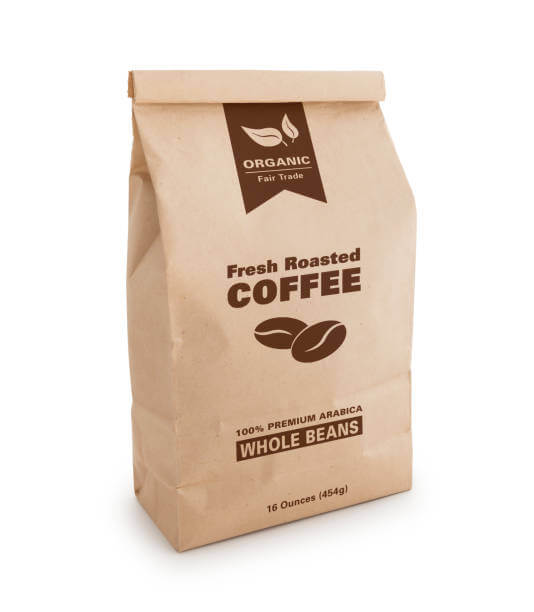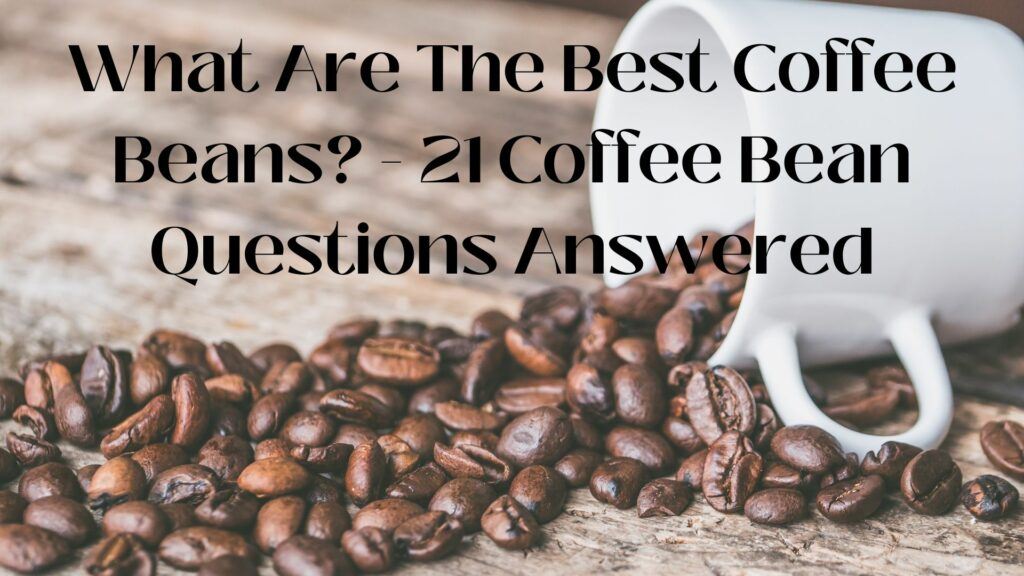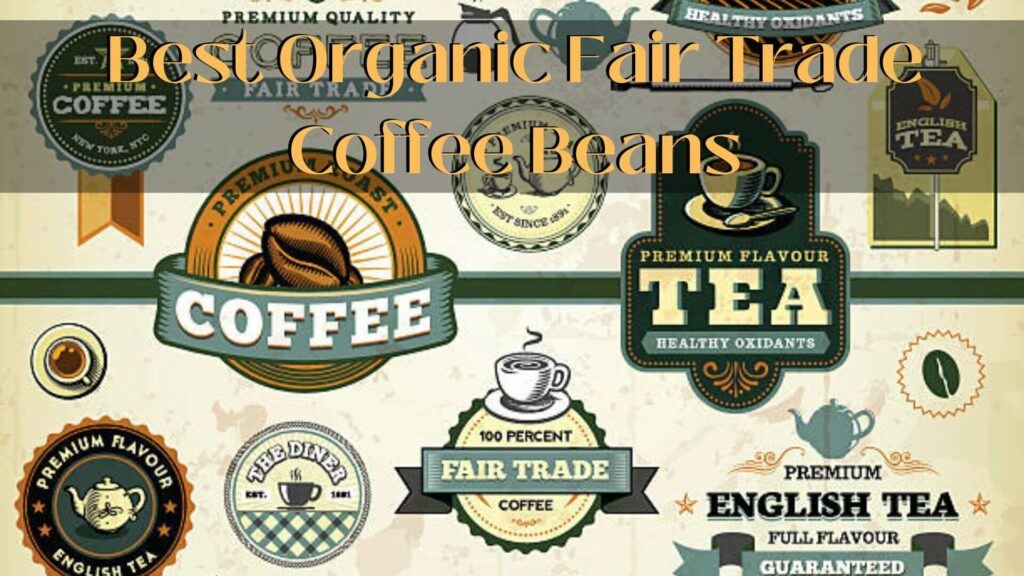In this blog post, we’ll explore the benefits of choosing organic fair trade coffee beans, how they’re different from conventional coffee beans, and why supporting this movement is crucial for the sustainability of the coffee industry. We’ll also share some tips on how to brew the perfect cup of coffee using organic fair-trade beans and where to find them. So, grab a cup of coffee, and let’s dive in!
Coffee is the world’s second-most traded commodity after oil. It’s a daily ritual for millions of people worldwide and an essential source of income for millions of coffee farmers in developing countries. However, the coffee industry has been plagued by issues such as unfair trade practices, environmental degradation, and poor working conditions. That’s why the rise of organic fair-trade coffee beans has been a game-changer for both farmers and consumers.
What Are Organic Fair Trade Coffee Beans?

Organic fair trade coffee beans – sounds fancy, doesn’t it? But fear not, my caffeine-loving friends; it’s not just another hipster trend or a sneaky marketing ploy. In fact, organic fair trade coffee beans are the real deal, and they’re here to save the day (and the environment, and the farmers, and your taste buds).
Let’s break it down: “organic” means that coffee beans are grown without harmful pesticides or synthetic fertilizers, which is better for your health and the planet. “Fair trade” means that the farmers who grow the coffee beans are paid a fair price for their hard work, and their working conditions are decent (as in, no more slave labor or child exploitation).
Now, I know what you’re thinking: “But just Another Cuppa Coffee; I don’t care about all that hippie-dippie stuff; I just want my morning caffeine fix!” Well, my dear readers, here’s the thing: organic fair trade coffee beans are ethically sound and ridiculously delicious. They have a richer, more complex flavor profile than conventional coffee beans, with notes of chocolate, fruit, and even floral undertones.
Plus, you can feel good about your purchase knowing that you’re supporting a more sustainable and just coffee industry. It’s a win-win situation, really. So next time you’re reaching for that bag of generic coffee beans, think twice and go for the organic fair trade coffee beans instead. Your taste buds (and the world) will thank you.
related article in just another cuppa coffee
Buying freshly roasted coffee beans is the best way to ensure that you get the best coffee beans. But just what are the best coffee beans and why??

What Are The Downsides Of Organic Fair Trade Coffee?
As much as I love organic fair trade coffee beans (and trust me, I really do), I have to admit that this hipster-approved beverage has a few downsides. Now, hear me out before you start throwing your coffee mugs at me.
First of all, organic fair trade coffee beans can be a bit more expensive than their conventional counterparts. I know, I know, you’re willing to pay any price for a good cup of coffee, but sometimes it can feel like you’re sacrificing an arm and a leg just to get that eco-friendly, socially responsible label on your coffee bag. Plus, let’s be real, you’re not exactly rolling in dough just because you care about the environment and fair trade, right?
Secondly, while organic fair trade coffee beans are definitely better for the environment and the farmers who grow them, they’re not a magic bullet for all the problems of the coffee industry. In fact, some critics argue that the fair trade system is not perfect and that it can sometimes perpetuate certain inequalities or fail to reach the most marginalized farmers. And as for the organic part, well, let’s just say that not all organic certifications are created equal, and there’s still some debate about the actual environmental benefits of organic farming.
Finally, and this is a personal pet peeve of mine, sometimes the label “organic fair trade coffee” can be a bit of a mouthful. I mean, try saying that five times fast without spilling your coffee all over your keyboard. And don’t even get me started on the baristas who have to write that on your cup. It’s like they’re trying to set a world record for the longest coffee order ever.
All joking aside, organic fair trade coffee beans are still a great choice if you want to support a more sustainable and just coffee industry. Just be aware that there are some trade-offs and that you might have to pay a bit more or do some extra research to find the right brand for you. But hey, isn’t that the price we pay for a guilt-free cup of joe?
What Is The Upside Of Organic Fair Trade Coffee?
Ah, organic fair trade coffee beans, my dear caffeine-loving friends. Is there anything better than a steaming hot cup of coffee that tastes amazing and makes you feel like a superhero supporting a more sustainable coffee industry? I think not. So, let’s talk about the upsides of this magical elixir.
First and foremost, organic fair trade coffee beans are better for the environment than conventional coffee beans. You see, organic farming practices avoid the use of harmful pesticides and fertilizers, which can leach into the soil, water, and air, causing all sorts of environmental problems. By choosing organic fair trade coffee beans, you’re reducing your carbon footprint and supporting farmers who are committed to protecting the planet for future generations.
Secondly, and this is a big one, fair trade coffee means fair prices for farmers. That’s right, when you buy organic fair trade coffee beans, you’re making sure that the farmers who grow them get paid a decent wage for their hard work. No more exploitation, no more poverty, no more injustice. And you get to enjoy a delicious cup of coffee in the process. It’s a win-win situation.
But wait, there’s more! Organic fair trade coffee beans also taste better than conventional coffee beans. I know, I know, the taste is subjective, but trust me on this one. Organic farming practices allow the coffee plants to grow more naturally, enhancing the coffee beans’ flavor and aroma. Plus, fair trade coffee is often single-origin, meaning that you get to taste the unique terroir of each coffee-growing region. It’s like a mini world tour in a coffee mug.
So there you have it, my friends. There are many upsides of organic fair trade coffee beans, and they’re all pretty awesome. Not only are you supporting a more sustainable and just coffee industry, but you’re also getting a delicious cup of coffee that tastes like a dream. So go ahead, pour yourself a cup, take a sip, and feel like a superhero. You deserve it.
Our Pick- Top 5 Organic Fair Trade Coffee Beans Chosen By Our Subscribers
Are you tired of mediocre coffee that tastes like it’s been brewed in the depths of the underworld? Do you want to support a more sustainable and just coffee industry while also indulging in the best coffee beans on the market? Look no further, my friends, because I’m about to give you the lowdown on the top 5 organic fair trade coffee beans that will make your taste buds sing and your conscience feel good. And, of course, I’ll do it all in my signature humorous tone. So, without further ado, let’s get brewing!
1. ethiopian yirgacheffe
This coffee bean is like a fancy evening gown, elegant and sophisticated with a touch of sass. Ethiopian Yirgacheffe is known for its fruity and floral flavor notes, with hints of blueberry, jasmine, and citrus. It’s a medium roast that will wake you up with a punch of caffeine while also tantalizing your taste buds with its complex and nuanced flavor profile. Plus, it’s grown by small-scale farmers who are committed to sustainable and fair farming practices. In other words, it’s the coffee equivalent of a vegan, gluten-free, and ethically-sourced artisanal pastry.
2. colombian supremo
Colombian Supremo is the way to go if you’re looking for a classic and dependable coffee that never disappoints. This medium-bodied coffee has a rich and nutty flavor, with a hint of chocolate and caramel. It’s a versatile coffee that can be enjoyed as a morning pick-me-up or a soothing afternoon treat. Plus, it’s fair trade certified, meaning that you’re supporting Colombian farmers who are paid fairly for their hard work. It’s the coffee equivalent of a trusty pair of jeans – always there for you when you need it.
3. sumatra mandheling
For the bold and adventurous coffee drinkers out there, Sumatra Mandheling is a must-try. This coffee bean is known for its earthy and smoky flavor, with dark chocolate and cedar notes. It’s a full-bodied coffee that will leave you feeling like you’ve just conquered a mountain (even if you’ve just conquered your inbox). Plus, it’s organic and fair trade certified, meaning you’re indulging in delicious coffee and supporting sustainable and just farming practices. It’s the coffee equivalent of a rugged hiking boot – sturdy, dependable, and ready for any adventure.
4. guatemalan antigua
If you’re in the mood for a rich and complex coffee, Guatemalan Antigua is the way to go. This coffee bean is known for its smoky and spicy flavor, with dark chocolate, nutmeg, and cinnamon notes. It’s a medium roast that will leave you feeling warm and fuzzy inside like you’ve just been wrapped in a cozy blanket. Plus, it’s fair trade certified, meaning that you’re supporting Guatemalan farmers who are paid fairly for their hard work. It’s the coffee equivalent of a snuggly cat – comforting, soothing, and always there to make you feel better.
5. costa rican tarrazu
Last but not least, we have Costa Rican Tarrazu, a coffee bean that’s as luxurious as it is delicious. This coffee is known for its bright and citrusy flavor, with hints of apricot, peach, and orange. It’s a light-bodied coffee that will leave you feeling refreshed and rejuvenated as if you’ve just taken a dip in a crystal-clear pool. Plus, it’s organic and fair trade certified, meaning that you’re supporting Costa Rican farmers committed to sustainable farming practices. It’s the coffee equivalent of a day at the spa – indulgent, refreshing, and good for the soul.
Best Organic Fair Trade Coffee Beans Conclusion
There you have it, folks! The top 5 organic fair trade coffee beans that will satisfy both your taste buds and your moral compass. Whether you’re in the mood for a fruity and floral Ethiopian Yirgacheffe or a smoky and spicy Guatemalan Antigua, these coffee beans have got you covered.
And remember, by indulging in these delicious and sustainable coffee beans, you’re supporting farmers who are committed to fair and just practices and saving the planet one sip at a time. So go forth, brew a cup (or three) of your favorite organic fair trade coffee, and pat yourself on the back for being a conscientious coffee drinker. Because let’s be real, there’s nothing better than being able to sip on something delicious while also feeling like a superhero.
And if you need a little extra motivation to start brewing, just think about all the mediocre coffee you’ll be avoiding by choosing these top 5 organic fair trade coffee beans. Life’s too short for bad coffee, folks. So let’s raise a cup to the good stuff and say goodbye to the swill.






